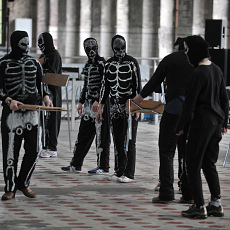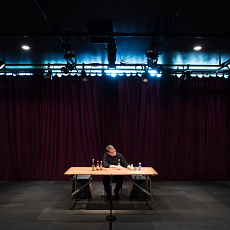How We Work
Combining discussion, improvisation and writing, our rehearsal process is a creative laboratory that discovers unexpected and inspiring answers to questions of life and art – a process that is considered exemplary in the field of contemporary performance and studied as a model of outstanding good-practice across the world.
As six people who have worked together more or less continually for over 30 years we share a big history and a lot of skills, conversations and ideas. We also share input into and responsibility for the work we produce.
Collaboration – as agreement and as disagreement – is at the heart of everything we do. The long-term creative work of the group, co-operating as equals over the years and building up a truly shared language, repertoire, skills and ways of working, is the bedrock of Forced Entertainment, an artistic approach that is also a political way of thinking about how to make art and how to live and work with others. The participation and skill sharing work we do with young people and with younger artists is designed to share these approaches and to open creative possibilities and ways of thinking and doing for other people.
Since we like new ideas and approaches we often invite other artist to help realise our work; and our projects also involve the input of younger, early career artists, joining our work at the same time as developing their own skills.
Each project is different but of course there are things we come back to. With a few exceptions we don’t work with a ready-made text so making a show usually starts with us in a rehearsal room – discussing ideas, raiding the dressing-up box, trying a line of dialogue, playing a soundtrack, improvising a scene until something starts to stick. Then we keep developing the material – we experiment with it, debate it, videotape it, watch it, adapt and edit it before trying it on an audience which can open up a whole new set of questions.
The last weeks of rehearsal often see us focused on being able to control and effectively repeat material that was developed during early improvisations. Getting something that perhaps happened by accident the first time to happened again and again convincingly calls for some serious skills. The same final stages of rehearsals also often involve us trying to fix a sequence or structure for the various sections of material we have developed – trying to get the journey of the piece to feel right. There might not be a story but there is always a development across the timeline of a work, a set of tensions that are established, thickened, contradicted and perhaps even resolved.
Find out more about how we work by using the links on this page.











